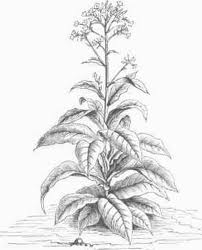Nicotine is produced by the tobacco plant and can be regarded as a biological pesticide. The tobacco plant produces nicotine in the roots and then exudes it from the leaves to prevent insects from eating the plant.
When tobacco is smoked, nicotine is absorbed through the wall lining of the small air sacs in the lungs. When sniffed or chewed, it is absorbed through the mucous membranes of the nose or mouth. Nicotine can also be absorbed easily through the skin which is the main cause of second hand smoking.
Regardless of how nicotine is absorbed, it enters the bloodstream where it circulates throughout the body and travels to the brain where it crosses the blood-brain barrier. Once in the brain, it binds to and activates receptors called the cholinergic receptors.
These cholinergic receptors are present in the brain as well as in other areas such as the muscles, heart, adrenal glands and other vital organs. Normally, these receptors are activated by the neurotransmitter acetylcholine which is produced at nerve endings in the brain and in the nerves of the peripheral nervous system.
The actions of acetylcholine help to maintain healthy respiration, heart function, muscle movement and cognitive functions such as memory.
Since nicotine has a similar structure to acetylcholine, it can activate the cholinergic receptors. However, unlike acetylcholine, nicotine enters the brain and disrupts its normal functioning. Regular smoking leads to a change in the number of cholinergic receptors and to changes in their sensitivity to nicotine. This can lead to the development of nicotine tolerance.
As well as disrupting normal nerve function nicotine also causes the blood vessels to constrict and therefore blood circulation is restricted and it raises the blood pressure, this can lead to numerous problems.
Cancer is usually the first thing that people associate with smoking but there are many other problems that can be caused by smoking because of the effects it has on blood circulation and the nervous system.
It makes sense to quit smoking. It makes sense to stop smoking cigarettes and breathe fresh air. Why not stop smoking now!
